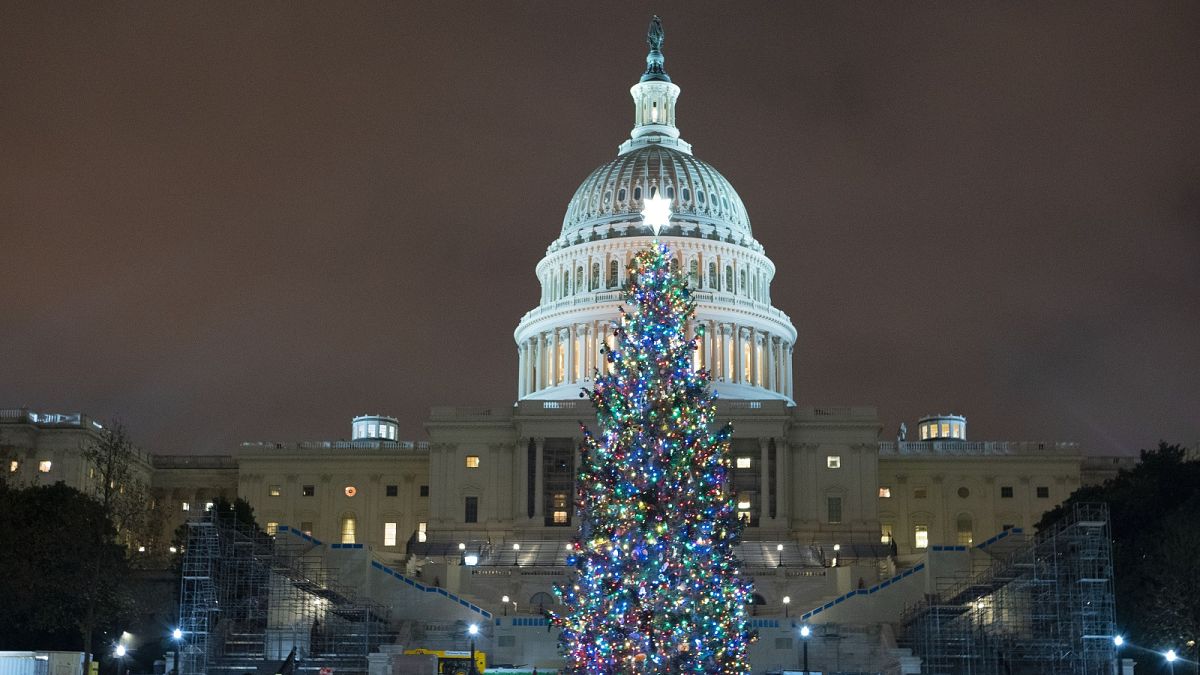Millions of Americans hit by the impact of the coronavirus pandemic will now receive financial help after Republicans and Democrats agreed on a long-overdue relief package.
Top negotiators in the US Congress sealed a deal on a $900 billion (€738 billion) COVID-19 economic relief package, finally delivering long-overdue help to businesses and individuals and providing money to deliver vaccines to a nation eager for them.
The package, expected to draw votes in Congress on Monday, would establish a temporary $300 (€246) per week supplemental jobless benefit and a $600 (€492) direct stimulus payment to most Americans, along with a new round of subsidies for hard-hit businesses and money for schools, health care providers and renters facing eviction.
It came together on Sunday after months of battling and posturing, but the negotiating dynamic changed in Republicans' favour after the election and as the end of the congressional session neared. President-elect Joe Biden was eager for a deal to deliver long-awaited help to suffering people and a boost to the economy, even though it was less than half the size that Democrats wanted this fall.
Biden praised the bipartisan spirit that produced the measure, which he called "just the beginning".
"This is a model for the challenging work ahead for our nation," Biden said in a statement on Sunday.
House leaders informed lawmakers that they would vote on the legislation on Monday, and the Senate was likely to vote on Monday, too. Lawmakers were eager to leave Washington and close out a tumultuous year.
"There will be another major rescue package for the American people," Senate Majority Leader Mitch McConnell said in announcing the agreement for the relief bill. "It is packed with targeted policies to help struggling Americans who have already waited too long".
Democrats acknowledged it wasn’t as robust a relief package as they initially sought — or, they say, the country needs. House Speaker Nancy Pelosi vowed more to come once President-elect Joe Biden takes office.
"It is a first step," she said. "We have to do more".
A fight over Federal Reserve emergency powers was resolved on Saturday night by the Senate’s top Democrat, Chuck Schumer, and conservative Republican Pat Toomey. That breakthrough led to a final round of negotiations on Sunday.
Still, delays in finalising the agreement prompted the House to pass a one-day stopgap spending bill to prevent a government shutdown at midnight on Sunday. The Senate was likely to pass the measure on Sunday night as well.
The final agreement would be the largest spending measure yet. It combined $900 billion (€738 billion) for COVID-19 relief with a $1.4 trillion (€1.19 trillion) government-wide funding plan and lots of other unrelated measures on taxes, health, infrastructure, and education. The government-wide funding would keep the government open through September.
Passage neared as coronavirus cases and deaths spiked and evidence piled up that the economy was struggling. The legislation had been held up by months of dysfunction, posturing and bad faith. But talks turned serious in recent days as lawmakers on both sides finally faced the deadline of acting before leaving Washington for Christmas.
"This bill is a good bill. Tonight is a good night. But it is not the end of the story, it is not the end of the job," Schumer told reporters. "Anyone who thinks this bill is enough does not know what’s going on in America".
The $300 (€246) per week bonus jobless benefit was one half the supplemental federal unemployment benefit provided under the $1.8 billion CARES Act in March and would be limited to 11 weeks instead of 16 weeks. The direct $600 (€492) stimulus payment to most people would also be half the March payment, subject to the same income limits in which an individual’s payment began to phase out after $75,000 (€61,500).
The CARES Act was credited with keeping the economy from falling off a cliff amid widespread lockdowns this spring, but Republicans controlling the Senate cited debt concerns in pushing against Democratic demands. Republican politicians, starting with President Donald Trump, focused more on reopening the economy and less on taxpayer-financed steps like supplemental jobless benefits.
Progress came after a bipartisan group of pragmatists and moderates devised a $908 billion plan that built a middle ground position that the top four leaders of Congress — the GOP and Democratic leaders of both the House and Senate — used as the basis for their talks. The lawmakers urged leaders on both sides to back off of hard-line positions.
"We put our heads down and worked around the clock for nearly a month to produce a bipartisan, bicameral bill to address the emergency needs of our country," the bipartisan group of about a dozen lawmakers said in a statement. “Our consensus bill was the foundation of this final package".
